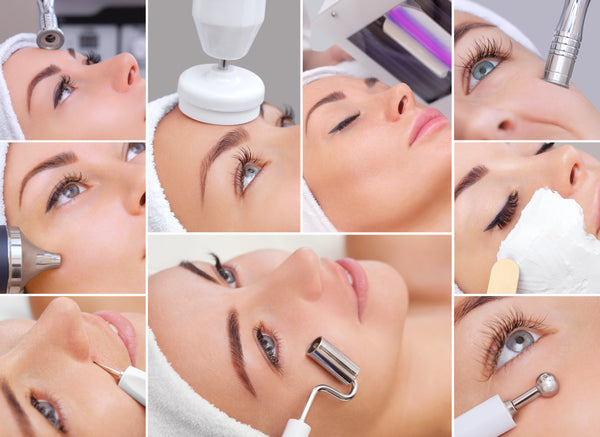
1. Lack of Confidence
It is important to do research for yourself and form your own opinions. Like everything else, there are facts and there are opinions in esthetics. For example, "microdermabrasion is an exfoliation procedure in which a coarse tip or micronized crystals are used to remove dead skin cells on the surface of the skin." This is a fact. An opinion would be "microdermabrasion is the best treatment for anti-aging." Unless there was clinical evidence that shows microdermabrasion is better than any other treatment for aging skin, that would be the individual’s opinion. The facts are generally what we learn from textbooks and research. Opinions are typically formed from our knowledge and experience.
One of the great things about our career is the ability to be creative. Using a combination of knowledge and experience, estheticians are able to customize treatments for each client. For example, a client may come in with concerns of aging and see an esthetician that recommends a chemical peel and products containing vitamins A, C and E. If the same client went in to see another esthetician, she may receive microcurrent and products with stem cells and peptides. Neither of these is right nor wrong, as they should both provide an improved appearance of the skin. The customization is what makes us unique in our ability to treat the skin. In order to provide the best recommendations for your clients, continue to research and form educated opinions.
2. Limiting Yourself
There are several resources to keep yourself educated and in the know. Social media continues to progress, especially in our industry. There are several great esthetic groups to join that help estheticians tremendously. These groups can be a great resource to let estheticians ask their peers for opinions. However, it is important to use them as a starting point for further education and not as the ultimate answer. You need to be cautious of what you read. For example, there was a case where a client had a lesion on her upper eyelid. The post had received a lot of comments stating it was a milia and recommended to lance it. However, this lesion was not a milia. It was a xanthelasma (a cholesterol deposit), which should only be treated by a physician. As great as social media is, it shouldn’t be your only outlet for education. Classes, books, magazines and search engines are other great resources as well.
When asked, I would give my opinion to my students or peers but encourage them not to just take my word for it but to gather information and form their own opinion. This creates a platform for experience-based conversation. For instance, my go-to for acne is typically a chemical peel, while others may use something else. Be open to other people’s views. What works on one person may not work on another. Have an open mind, adapt to each client and challenge yourself.
3. Not Using Time Wisely
You need to make valuable use of your time. For instance, there is often a certain amount of downtime in undergraduate programs. Students need to put in a specific number of hours according to the state they are practicing in. It is vocational education and sometimes taking the extra initiative to increase knowledge is in your own hands. Bring in family and friends to do treatments on or practice on each other. If there is no one to practice on, look for opportunities to shadow other students. By doing that, you may learn a new technique or see something interesting. Ultimately, seeing a variety of skin types and how they react to particular treatments will improve your understanding of the skin. Seeing treatments first-hand will also give you a stronger ability to describe what the client may experience. Additionally, trading treatments is highly beneficial to both parties. Providing treatments to a peer will allow for honest feedback. Receiving treatments will also help to provide a better understanding of potential reactions and results.
The same goes for when you have a job. Too often, I hear estheticians complain that they are not busy. This is the perfect opportunity to shadow other providers. When I started at a plastic surgeon’s office, I spent my days shadowing the medical providers and assisting them throughout the day. This led to me quickly learning about esthetics in a medical setting including gaining extensive knowledge on medical procedures. This is not only applicable to the medical field. Shadowing a seasoned esthetician will provide a wealth of experience-based knowledge as well. If you don’t have other providers to shadow, consider doing an internship. Internships are also a great way to submerge yourself into various settings so you can decide which path you want to take your career. Be resourceful. In this industry time is money, use it wisely.
4. Not Evolving
First and foremost, you must always be open to receiving more education. Most estheticians are great about continuing their education and appreciate any learning experience they get. Unfortunately, not everyone has the same mindset. We have an ever-evolving industry and as estheticians, it is our job to be up-to-date on the latest and greatest. There is always more to learn! It doesn’t matter how much you currently know; there are new treatments and products coming out rapidly. Heightening your education isn’t always about taking classes. If taking a class is not an option, there are online programs, books, magazines and esthetic forums.
Courses that offer non-product specific education can be the most versatile. If money is an issue, there are also several product companies that offer low-cost or free education. These are most often product specific training programs and may be biased. If nothing else, you can learn about a product you didn’t currently have knowledge on. It is great to have a broad understanding of several product lines to make yourself more relatable. I also highly recommend going to shows such as Face & Body, where a variety of courses, product-specific and non-productspecific, are abundant. Trade shows are great networking events that can open avenues to create a circle of peers. Overall, continuing your education on a regular basis is vital to flourish in your career.
5. Not Doing Your Homework
It is important to seek out the best education for your needs. This is where you will learn the fundamentals in an undergrad program or take your career to the next level with advanced education. This is an investment in your career. Make sure you choose the right program(s) for you. What is your focus; do you want to learn more about lasers, ingredients, makeup, waxing, etc? First, get a list of companies that offer the education you are looking for. Next, you want to do your research on the schools and educators. Is the educator known in the industry? Is the education center reputable? Do you want an educator with experience in the field? Did the school and educators have good reviews? If you’re still unsure, go to the forums mentioned previously and consult your peers or mentors.
Choosing the course best for you requires homework, but so do the courses themselves. In order to retain the information, personal study and practicing skills are a must. Everybody has a different learning style. It is important to identify what works for you; it could be visual, verbal or physical. Acknowledge your learning style and create the best environment for self-study. Gaining and retaining the information are equally important when it comes to furthering your education, so always do your homework.
Final Recommendations
In an effort to avoid mistakes in education, my recommendations are as follows. You must know how to differentiate fact from opinion, then use that knowledge to be creative in your recommendations. Don’t limit yourself by using just one source for education. Use a variety of resources and challenge yourself. Take education into your own hands, using your idle time effectively. You must be open-minded and able to adapt to the growth in our industry. Doing your homework will ensure you are getting the best learning experience for you.
 Terri A. Wojak is a licensed esthetician with 23 years of experience. She is the education director for GlycoAla. Prior to that she served as director and educator at True U Esthetics. She co-authored Mastering Medical Esthetics and authored Aesthetics Exposed: Mastering Skin Care in a Medical Setting and Beyond. She is also a member of the Skin Inc. Editorial Advisory Board. Terri A. Wojak is a licensed esthetician with 23 years of experience. She is the education director for GlycoAla. Prior to that she served as director and educator at True U Esthetics. She co-authored Mastering Medical Esthetics and authored Aesthetics Exposed: Mastering Skin Care in a Medical Setting and Beyond. She is also a member of the Skin Inc. Editorial Advisory Board.
|
 This article appeared in the March 2020 issue. Find more on this topic in the digital magazine.
This article appeared in the March 2020 issue. Find more on this topic in the digital magazine.



0 comments